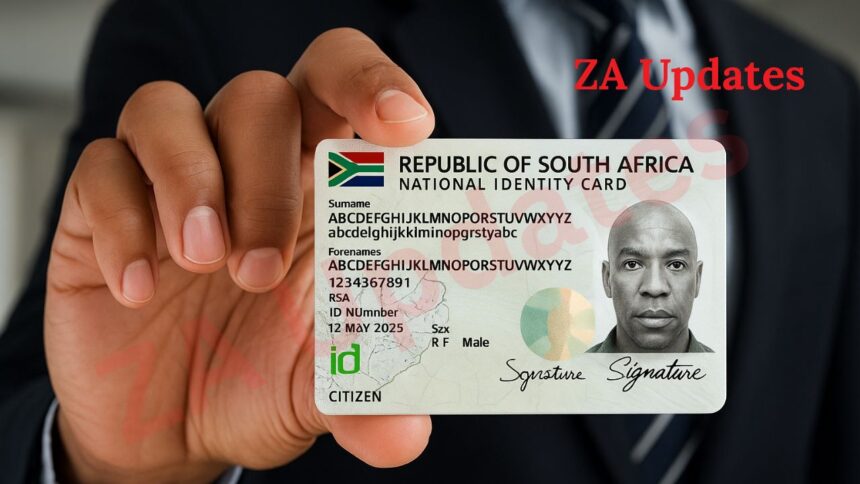Smart ID Cards are Now Available to Naturalized Citizens and Permanent Residents. The Department of Home Affairs in South Africa has officially announced that naturalised citizens and permanent residents are now eligible to apply for Smart ID Cards. This reform comes into effect starting Monday, 15 May 2025, and opens up digital access to the eHomeAffairs online portal, long restricted to South African citizens by birth.
The announcement, made by Minister of Home Affairs Leon Schreiber, marks a major stride in the country’s ongoing efforts to modernise public services and phase out the outdated green bar-coded ID books.
A Long-Awaited Development for Over 1.4 Million South Africans
For years, over 1.4 million naturalised citizens and permanent residents were excluded from South Africa’s digital identification framework. These individuals were compelled to rely on the green ID book, a legacy document widely criticised for its vulnerability to identity theft, forgery, and fraud.
According to Minister Schreiber, technical and bureaucratic limitations were the main obstacles preventing these groups from receiving Smart ID cards, a system that offers far greater security and convenience.
“This breakthrough for our digital transformation reforms directly delivers dignity to over 1.4 million people… who had their dignity infringed for years by being treated unequally,” said Minister Schreiber.
Previously, obtaining a Smart ID card for this group involved a tedious manual application process, often requiring special ministerial approval. Now, the same individuals can apply through the standard Smart ID application channels, including the user-friendly eHomeAffairs online system.
Digital Transformation and Security Gains
The expansion of Smart ID eligibility goes beyond administrative convenience. It is also a strategic national security initiative. By allowing all legal residents to transition to digitally secure identification, the government is taking a firm stand against identity fraud and reinforcing digital equality.
“Naturalised citizens and permanent residents were the last remaining groups still using the green ID book. This change eliminates a long-standing gap,” the Minister explained.
The reform is in line with broader digital transformation goals that aim to modernise how government services are delivered. It reflects the Department’s commitment to building a more inclusive, secure, and efficient national identification system.
Access Expanded Through eHomeAffairs and Bank Partnerships
With Smart ID cards now available to all eligible groups, the focus has shifted to expanding access. One of the pivotal developments includes plans to extend Smart ID and passport application services to more bank branches across the country.
This initiative will:
- Reduce queues and pressure on traditional Home Affairs offices,
- Make services more accessible in under-served areas,
- And align Home Affairs with modern service delivery models.
Additionally, Home Affairs offices will implement extended operating hours to cater to the surge in applications from newly eligible applicants.
Goodbye Green ID Books
The goal to phase out green ID books is now closer than ever. With no eligible group left behind, the Department is working rapidly to ensure nationwide access to the Smart ID system.
| Document Type | Availability | Security Level |
|---|---|---|
| Green ID Book | Legacy document | High risk of fraud |
| Smart ID Card | Available to all SA citizens and permanent residents | Secure biometric data |
| Smart Passport | Selected bank and DHA branches | Enhanced travel security |
“We are making rapid progress in using digital transformation to deliver Home Affairs @ Home,” said Schreiber.
This initiative not only modernises service delivery but also restores dignity to those who were marginalised due to outdated systems.
How to Apply for a Smart ID Card
If you’re a naturalised South African citizen or a permanent resident, here’s how you can apply:
- Register on the eHomeAffairs portal: www.ehome.dha.gov.za
- Complete the application form online.
- Upload supporting documents, such as your naturalisation certificate or permanent residence permit.
- Make an appointment at your nearest Home Affairs office or participating bank branch.
- Pay the applicable fee online.
- Visit the selected branch to capture your biometrics and complete your application.
Applications submitted online are typically processed faster, with SMS/email updates available at each stage.
Impact on South African Society
This policy shift brings numerous social and administrative benefits:
- Restores equality and dignity to previously excluded citizens.
- Boosts national security by ensuring everyone uses secure identification.
- Improves digital access for marginalised communities.
- Reduces fraudulent activities associated with older ID documents.
- Accelerates government’s e-governance transformation goals.
It’s not just a technical upgrade; it’s a step toward inclusivity, respect, and modern governance.
FAQs About Smart ID Cards
Q1: Who qualifies for a Smart ID Card in So uth Africa now?
All South African citizens (by birth, descent, or naturalisation) and lawful permanent residents can now apply for a Smart ID Card.
Q2: Can I apply online?
Yes. Applications can be submitted via the official eHomeAffairs portal.
Q3: What if I still have a green ID book?
You can still use it for now, but it’s highly recommended to switch to a Smart ID Card for better security and digital access.
Q4: Is there a cost involved?
Yes. A Smart ID Card typically costs around R140, but fees may vary.
Q5: Which banks currently offer Smart ID applications?
Selected branches of ABSA, FNB, Nedbank, and Standard Bank offer Home Affairs services.
Conclusion
The decision to allow naturalised citizens and permanent residents to apply for Smart ID Cards is a milestone in South Africa’s digital governance journey. It aligns the nation with global best practices and strengthens the country’s commitment to equal rights, secure documentation, and improved service delivery.










